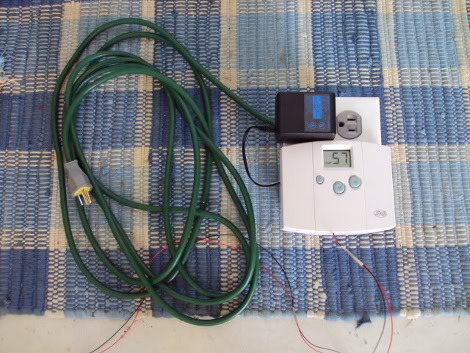Beer brewer’s temperature controller
Thursday, September 17, 2009

Steady fermentation temperatures, usually at about 65 degrees Fahrenheit, are an important part of brewing beer. Because of this, the wort (unfermented beer) is often temperature controlled during fermentation. [android] needed a temperature controller for fermenting beer in a chest freezer. Much like the energy efficient fridge hack from last month, the chest freezer is switched on and off to achieve the desired temperature. Instead of buying a controller, [android] built around an existing design. His project uses a solid state relay to switch an outlet on and off.
The temperature is controlled by a home thermostat. He removed the thermistor from the unit and extended it with 24 gauge wire so that it can go inside of the chest freezer. Utilizing a junction box, the freezer is plugged into one switched outlet and controlled by the thermostat via the relay. The other outlet is unswitched and provides DC power for the relay using a wall wort transformer. Although this thermostat cannot be set cold enough for lagering, it is perfect for keeping kegs at the correct beer serving temperatures when not being used for fermentation.

1 komentar:
Sorry, bull.
To quote: “when laymen hear the root “kilo” they think 1000″
That’s because that’s CORRECT. The Metric prefixes are base-10 prefixes. Period. Computer Science used these prefixes because they were close enough, when we first started using them. Error didn’t accumulate that fast when you were talking about 80 meg hard drives. However, the gigabyte/terabyte/petabyte age is here, and those discrepencies are HUGE. Metric prefixes just don’t work to approximate these higher powers of 2.
However, saying that 1 kilobyte = 1024 bytes is, in point of fact, incorrect. The metric prefix “mega” means 1000. The correct term is kibibyte – KiB. 1 KiB = 1024 bytes. The fault here is not on Apple – they’re simply calculating a kilobyte as it SHOULD be calculated. The fault lies with the computer science folks for using metric prefixes incorrectly for so long.
As for the argument that the meaning of the prefixes has changed and we should keep the status quo – what if ever field did that? What if you had to remember that 1 kilogram was really 1001 grams or 1 micromole was really .000000101? Start using metric prefixes incorrectly and you set a dangerous precedent. Why should a computer be special? Why should 1 kilobyte be 1024 bytes, but one kilo-anything-else be 1000?
So good for Apple – call things what they ARE. Use standards (and that’s exactly what they are) correctly. Use KB for 1000 bytes, and KiB for 1024. (you can control-click to get file info if you REALLY want to, just like a Windows box that tells “space on disk”)
Now, are they doing this to sell “larger capacity hard drives?” Nope. Go to ANY website that sells hard drives and look at the calculation for GB. Go ahead, I’ll wait. See where it says “1 GB = 1000000 bytes”? Hard drive manufacturers have been doing this for a LONG time now. This is SOP in hard-drive land. All this update in Snow Leopard means is that when you buy a 500 gig drive, it’ll show up in Finder as 500 gigs (OK, a little less because of formatting, but you get the picture). This in no way affects ONLY Apple HDDs – ANY hard drive will be counted in base 10. How is that a competitive advantage to their hardware sales? The only think that will happen is the “actual formatted capacity may vary” footnote will refer to the fact that the disk formatting takes some space, not the fact that disks are sold in base 10 sizes then treated in the computer as base 2.
Also, what’s up with this “Real Math” crap? What is that, other than FUD? Yes, computers operate in base 2. So? That doesn’t mean all other bases are incorrect. I guess, since base 2 is the REAL math, I’ll have to go tell all the mathematicians in the world that their work is irrelevant.
To sum up:
“the term kilobyte was adopted to represent 2 to the 10th power bytes”
This was a bad move, ignored what “kilo” meant, and should never have been done.
“doesn’t Apple have a lot to gain if all the storage-containing-hardware they sell sounds bigger than it actually is?”
HDD manufacturers already do this, as stated earlier in the summary. This point is irrelavent.
“(base 2, aka real math) … (base 10, aka fake math)”
WTF?
This article is FUD, plain and simple.
Post a Comment